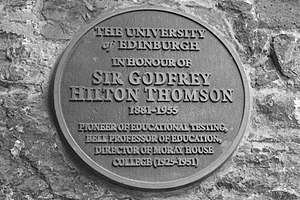Godfrey Thomson
Sir Godfrey Hilton Thomson FRSE DCL (27 March 1881 – 9 February 1955) was an English educational psychologist known as a critical pioneer in intelligence research.[1]

The Godfrey Thomson Unit for Research at Moray College in Edinburgh is named in his honour.[2]
Life
Godfrey Thomson was born in Carlisle on 27 March 1881 the son of Charles Thomson and his wife, Jane Hilton. His parents separated when he was young at his mother took him her native town of to Felling in Tyneside where he attended High Felling School. He then won a scholarship to Rutherford College of Technology. He studied at Armstrong College in Newcastle then spent some time at the University of Strasbourg under Prof Ferdinand Braun, working on Herzian waves.[3][4]
He worked at Armstrong College, Newcastle upon Tyne (a college of the University of Durham, England) from 1906 to 1925, before moving to the University of Edinburgh from 1925 until 1951, where he was the Bell Professor of Education and Director of the Moray House Teacher Training College.
His research began in psychophysics,[5] but he became best known for his criticism of Spearman's general factor in intelligence.[6] Pursuing this interest led to a major work on factor analysis of mental ability.[7]
Thomson was also active in work on the relationship between intelligence and fertility, conducting some of the first nationally representative sample research, which demonstrated that this relationship was negative.[8]
In 1926 he was elected a Fellow of the Royal Society of Edinburgh. His proposers were Ralph Allan Sampson, Alexander Morgan, Sir Edmund Taylor Whittaker and Norman Kemp Smith. He served as the Society's Vice President 1954/55.[9]
In 1931 he was responsible for organising and analysing the Scottish Mental Survey: Scotland's contribution to a European assessment of comparison between different countries in school examinations and their values.
Thomson was president of the British Psychological Society in 1945-1946.
He was knighted by King George VI in 1949.[10]
He lived his later years at 5 Ravelston Dykes in western Edinburgh.[11]
Publications
- Instinct, Intelligence and Character (1924)
- A Modern Philosophy of Education (1929)
Family
In 1912 he married Jane ("Jennie") Hutchinson (later Lady Jane Thomson), who was a fellow lecturer at the Armstrong College. They had one son, the diplomat Hector Thomson (1917-2008).[12]
References
- ODNB: Godfrey Thomson
- http://ourhistory.is.ed.ac.uk/index.php/Sir_Godfrey_Hilton_Thomson_(1881-1955)
- http://ourhistory.is.ed.ac.uk/index.php/Sir_Godfrey_Hilton_Thomson_(1881-1955)
- https://www.ed.ac.uk/education/about-us/maps-estates-history/history/godfrey-thomson
- Thomson, G. H. (1912). A comparison of psychophysical methods. British Journal of Psychology, 5, 203–241.
- Thomson, G. H. (1916). A hierarchy without a general factor. British Journal of Psychology, 8, 271–281.
- Thomson, G. H. (1939). The factorial analysis of human ability. London: University of London Press.
- Thomson, G. H. (1950). Intelligence and fertility: The Scottish 1947 survey. Eugenics Review, 41, 163–170.
- Biographical Index of Former Fellows of the Royal Society of Edinburgh 1783–2002 (PDF). The Royal Society of Edinburgh. July 2006. ISBN 0-902-198-84-X.
- Lovie, P. & Lovie, A. D. (2004). Thomson, Sir Godfrey Hilton (1881–1955). Oxford Dictionary of National Biography. Oxford University Press.
- https://www.thebritishacademy.ac.uk/sites/default/files/JBA-001-095-Deary.pdf
- https://www.scotsman.com/news/obituaries/hector-thomson-1-1158691